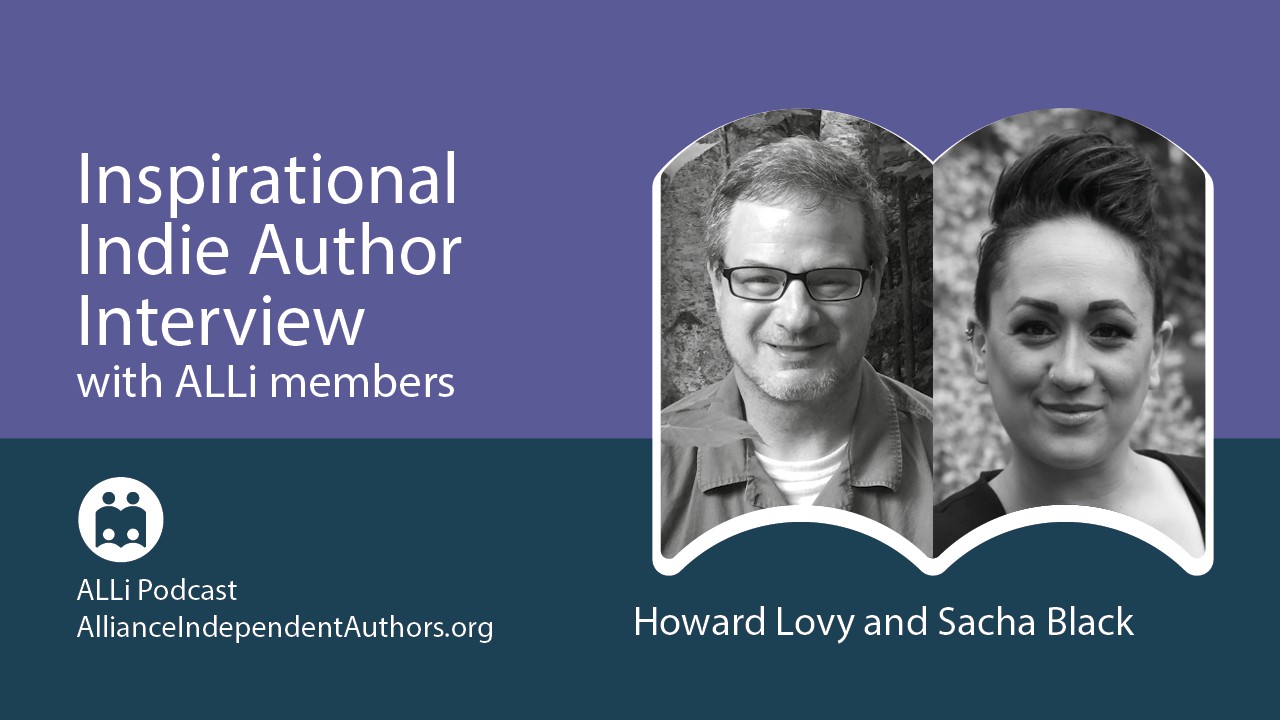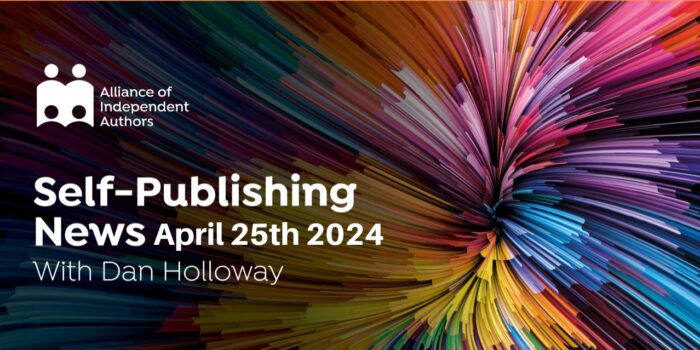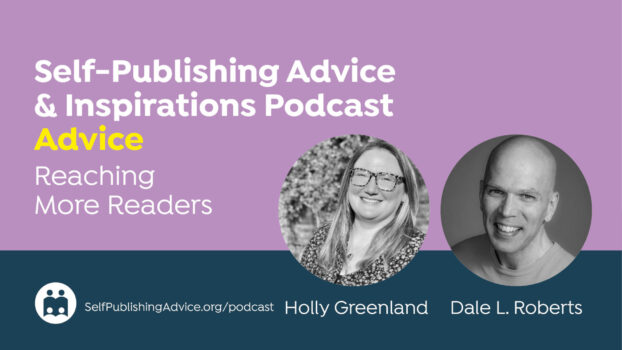My guest this week is Sacha Black, who many of you may already know as the cohost of our AskALLi Fiction and Nonfiction podcast and producer of our online self-publishing conferences. What you may not know is that Sacha got her start as a child actress for the BBC and is an expert in how to create a proper villain. There's more to her story, and nobody can tell it like Sacha, herself.
Every week I interview a member of ALLi to talk about their writing and what inspires them, and why they are inspiring to other authors.
A few highlights from our interview:
On Why She Loves Villains
Oh, because they're naughty, aren't they? They're the dark side, the rebels they’re like anti-heroes and are some of my favorite characters because they do the things that we're not allowed to, but that we all secretly want to.
On Writing Heroes
The biggest mistake I see with heroes is making your hero perfect. Nobody likes a Perfect Peter. Okay? They’re not a reflection of humanity and isn't it you know, not that you have to have complete accuracy in fiction you don't. But having a hero who's too perfect is just irritating.

Listen to My Interview with Sacha Black
Subscribe to our Ask ALLi podcast on iTunes, Stitcher, Player.FM, Overcast, Pocket Casts, or Spotify.
On Inspirational Indie Authors, @howard_lovy interviews @sacha_black, an expert in how to create a proper villain. There's more to her story, and nobody can tell it like Sacha, herself. Click To TweetFind more author advice, tips and tools at our Self-publishing Author Advice Center: https://selfpublishingadvice.org, with a huge archive of nearly 2,000 blog posts, and a handy search box to find key info on the topic you need.
And, if you haven’t already, we invite you to join our organization and become a self-publishing ally. You can do that at http://allianceindependentauthors.org.
About the Host
Howard Lovy has been a journalist for more than 30 years, and has spent the last six years amplifying the voices of independent publishers and authors. He works with authors as a book editor to prepare their work to be published. Howard is also a freelance writer specializing in Jewish issues whose work appears regularly in Publishers Weekly, the Jewish Daily Forward, and Longreads. Find Howard at howardlovy.com, LinkedIn and Twitter.
Read the Transcript of my Interview with Sacha Black
My guest this week is Sacha Black, who many of you know as the co-host of our AskALLi Fiction and Nonfiction Podcast, and Producer of our Online Self-Publishing Conferences. What you may not know is that Sacha got her start as a child actress for the BBC and is an expert on how to create a proper villain. There's more to her story, and nobody can tell it like Sacha herself.
Sacha: Hi, my name is Sacha Black and I am an author, a podcaster and an occasional developmental editor, as well and I also work with The Alliance of Independent Authors, as their blog manager and conference manager.
So, I read before I went to school. I read prolifically, my mom had to, you know, take me to bigger libraries rather than the local libraries because I just devoured everything. You know, I was one of those kids that went to the to the school library at lunchtime, rather than going outside to play with the other children because I wanted to read and I would write stories and you know, my favorite tutors were always the English teachers and I think if I had had any kind of self awareness, then I probably would have realized much younger that I wanted to write.
That said, I was always in the arts in some way or another, whether it be painting or creating something, and to acting and voiceover work. So, but the actual realization came much later when I was in a corporate job, after you know, going to University of being sort of not told, but encouraged to get a proper job. So, I was in corporate, the corporate world, and I hated it and needed an outlet and so I started blogging anonymously, just Sacha Black, which is not anonymous anymore.
Howard: In fact, she was not anonymous from a very young age. Let's backtrack a little bit and pick up Sacha's story when she was a child actor for the BBC.
Sacha: Acting was always, I was always in youth clubs, like youth drama clubs, or I was acting in a theater, or I was going to TV and film auditions.
So, I don't really remember a time when I wasn't doing that and before that, I was doing modeling because my mom used to make wedding dresses and clothes and things and although I'm far too short to be a runway model, but yeah, as a kid.
So, I mean, it really came to its culmination like its pinnacle in my teens, when I was on a BBC show as one of the lead characters, but I also did a lot of voiceover work. So, I did stuff as Club Seven. I did stuff for, like Haven Holidays, which probably nobody outside of the UK would have heard of. But it's like a big (inaudible.) I don't know if you have those in America, but they're like a Holiday Park Place. So, I did radio work and all kinds of things there.
So I did have training, I would say, with my voice, it was on CBBC, which is Children's BBC, but I was bullied really badly after that, and I stopped completely acting just because the bullying was so bad and it's terrible and I don't really like to have regrets, but I am mildly irritated with myself for having stopped just because of other people. I mean, looking back, it's obviously jealousy. But you don't, when you're a teenager, you're so impressionable and overly emotional anyway, so you just you It is what it is and hey, I'm laughing now because I'm working for myself so.
Howard: So, Sacha left acting, and was told she needed to get some kind of proper job. Eventually she wanted to local government doing something called Process Management.
Needless to say, she found it quite boring. More importantly, Sacha found that she didn't really fit into corporate culture.
Sacha: Six months into being there, I was told something that really scarred me. I was basically told that my personality was a risk to my reputation and I like it seems like such an innocuous thing but it really damaged me because I pride myself so much on being bubbly and a little bit loud on occasions and, you know, just full of life and so I got—I was quite low after that.
So, I just made up, and I went online, and I just started out pouring all of these emotions and, you know, feelings and the more I wrote, the more I fell in love with writing and remembered my love of writing. And that led me to the flash fiction community.
And so, I participated, I wrote loads, it was all terrible, like really awful and then I found Nano, and I dug up some notes from all my stories from my youth that I've been writing. There was one particular story or one particular character who had really stuck with me and I remember her because I'd been bullied that day and I climbed in my bedroom cupboard. I pulled all my toys out and I climbed in my bedroom cupboard and I sat there crying for a while and then I just picked up a pen and piece of paper and I couldn't. I was only about nine, I think, and I couldn't get the words out to describe her. So, I drew her instead and she was this girl with electricity around her hands and that was the girl that I found in my notes again, and that was the very first fiction book that I published.
Howard: So, she was off to the races as a writer. It wasn't long before Sacha learned that the most interesting characters in books she was writing, and reading were the villains.
She wrote a blog post on female villains that went viral. Why are villains so interesting?
Sacha: Oh, because they're naughty, aren't they? They're the dark side, the rebels they’re like anti-heroes and are some of my favorite characters because they do the things that we're not allowed to, but that we all secretly want to. By far one of the things I love in literature and film actually, more than anything is when a villain has, you know, like their concept or their issue with either the hero or society and when they're, I call it they're crazy, but when they're when you can agree with that ideology for just a second. You know, they make you stop and think, oh, I just think they are the most powerful stories.
Like Agent Smith is an example from The Matrix and he has this monologue, typical villain monologue, about humans and humanity being a virus, very topical at the moment, but being a virus on the on the planet and just for like a split second, I found myself agreeing with him and I think that is one of the most powerful things you can do in literature is to change somebody's mindset, you know, and make them just agree with something that's completely illogical.
Howard: So, Sasha became the villain expert publishing her first book on how to write them properly. She called it 13 Steps to Evil: How to Craft a Super Bad Villain. But it was primarily through her blog that she developed an audience of other writers.
Sacha: Oh, this is embarrassing. Basically, I have a really poor memory and I needed a place to put all of the lessons that I was learning about the craft of writing, so I didn't forget them. So, I started posting them, and other people found them helpful. So then I posted more of them, and you know how it goes this thing just exploded and mushroomed and very completely by accident, I built up this audience of other writers who were interested in the things that I'd learned and so I sort of fell into the role of teacher by, you know, it was very serendipitous and, and I just love being able to help people develop their prose, their characters, their story. And you know that the more I did it, the more I loved it, and the more other people loved it, which just encouraged me even more. So, yeah, I will never stop writing nonfiction now.
Howard: And as you can probably guess, Sacha has a very independent personality. So Indie Publishing was meant for her.
Sacha: Interestingly, I did come to writing thinking that I wanted to be traditionally published, but that was only because of a lack of education. So when I, you know, started to research online, I came across, you know, people like Joanna Penn, who were podcasting and it was through that education that I've very rapidly changed my mind and decided that I would rather retain control and also you know, I just didn't want somebody else telling me what I could have on my cover. So childish, but it’s true.
Howard: Sacha's next project is YA Fiction. She thinks like Sacha herself. She doesn't like her work to be pinned down to any specific category.
Sacha: What is it? I'm not entirely sure. I started out intending for it to be “YA” and the first book is definitely why the second book is clinging to YA, and the third book that I'm writing now is not really why, although it's in the same series, so I have this issue where I'm sort of stretched straddling YA and new adult and adult and certainly I would say some of the stuff that I'm writing now, which hopefully will be published next year is more on the adult side.
But I think, YA is this weird, hybrid genre where you have, yes, the actual cool young adults who are young who read it and then you also have the people like me who are in their 30s and 40s, who grew up with the explosion of things like, you know, The Hunger Games, Twilight, and all of that kind of stuff that you know, and we still read YA and you also have authors who are just tearing up the genre. Now there's writers like Sarah J. Maas, who basically writes pretty saucy books, and yet, they're still branded as young adult. So, I don't think young adult is what it used to be in terms of a very pure sweet genre. It's just not like that anymore. So yeah, I tried to redefine what it is that I'm writing as well.
Howard: But no matter how the fiction is defined, there are certain elements to a good story that are universal, and this is what she teaches in seminars for ALLi at conferences, and in her books.
Sacha: Well, your hero isn't the most important character. Let me start there.
So that's actually how I started. Like that's like my hook line for the villains book, is your hero isn't the most important character your villain is, and so many writers forget that at the core of any story is change. And you're hit you have a character at the start who is you know fraud or perhaps they are perfect and it's a downwards character story arc, you have a character and by the end of the book they are not the same character.
So, story is about change. But you can't have change unless you have some driving force to push your character to change and your villain or your antagonist or your conflicting force is that thing, so your villain is central to your, to every story. I'm saying villain as a catch-all phrase rather than being specific. You know, there are different shades of villain but loads of writers forget that and actually the biggest quickest fix to make any story better is to make your villain better. So that's probably the biggest mistake I see with villains.
The biggest mistake I see with heroes is making your hero perfect. Nobody likes a Perfect Peter. Okay? They’re not a reflection of humanity and isn't it you know, not that you have to have complete accuracy in fiction you don't. But having a hero who's too perfect is just irritating and it makes them look 2D as well, and that's a problem because people can't relate to that hero.
Howard: As for the future, Sacha has a lot of books left to write and that means more advice, more heroes, and of course, more villains.
Sacha: Yeah, I'm just writing and publishing more. I have some secret collaborations that are in the mix at the moment. I have a lot of stories and outlines to write. I probably have thirty books at the moment, in a file that need writing. So just a lot more books I would say and yeah and a lot more helping, too.





